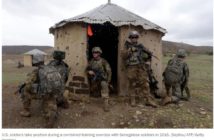

Moroccan diplomacy is called to fill a great void in English-speaking areas, especially in Africa, where Algeria and the Polisario are ahead of Morocco in the diplomatic battle over the Western Sahara issue.
Domestically, advanced regionalization is a prelude to the greater autonomy proposed by Morocco pending a final settlement of the territorial dispute.
These are the conclusions reached by a number of politicians, scholars and academics who were taking part in a roundtable held recently in Rabat, under the theme: “The Moroccan Sahara issue and the latest international and regional developments.”
Former Moroccan Foreign Minister, Saad Eddine El Otmani, explained that autonomy “is a higher level of advanced regionalization that must be effected, pending the settlement of the Sahara issue at the international level.”
Parallel diplomacy, the media, parliamentarians, academics and civil society should all endeavor to foil the maneuvers of Morocco’s opponents.
“The UN has not yet solved the Sahara problem and we are facing a global, long media battle,” said academic and political analyst Mohamed Toufik Gazoulet, who insisted on the relevant role of diplomacy, both official and parallel, in explaining the autonomy project and the impact it will have on the region.
Another participant underlined that Moroccan diplomacy actually needs to fill a great void in Anglophone countries, primarily in Africa. To illustrate his viewpoint, he recalled that Morocco’s diplomatic action in Francophone countries bore fruit as the majority of these states support the Moroccan position in the Sahara conflict.
Morocco has long left the field in this part of Africa open to its adversaries, especially Algeria and the Polisario, which made of the area their own preserve, he deplored.
A former Moroccan diplomat suggested that action should seek to enable the Sahrawis in the Tindouf camps to have enough freedom to say individually if they want to return to Morocco, stay in Tindouf or settle in another country.
Participants have all agreed on the need to deploy a new strategic and communication approach to explain the relevance of the Moroccan autonomy proposal and to support and promote this initiative.






